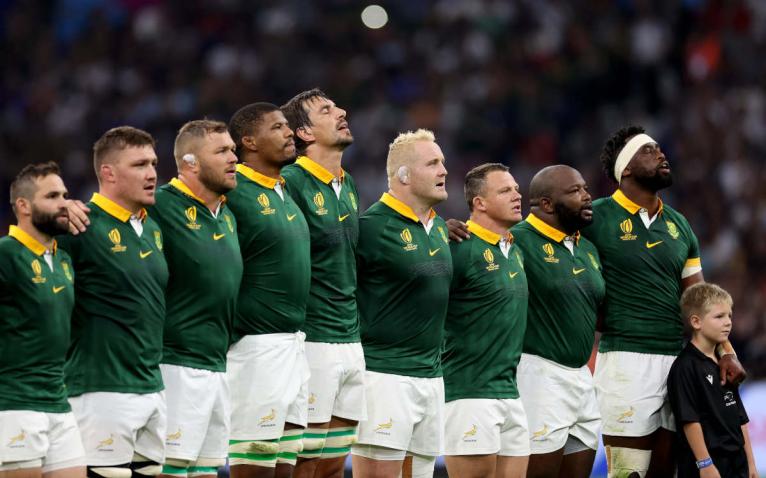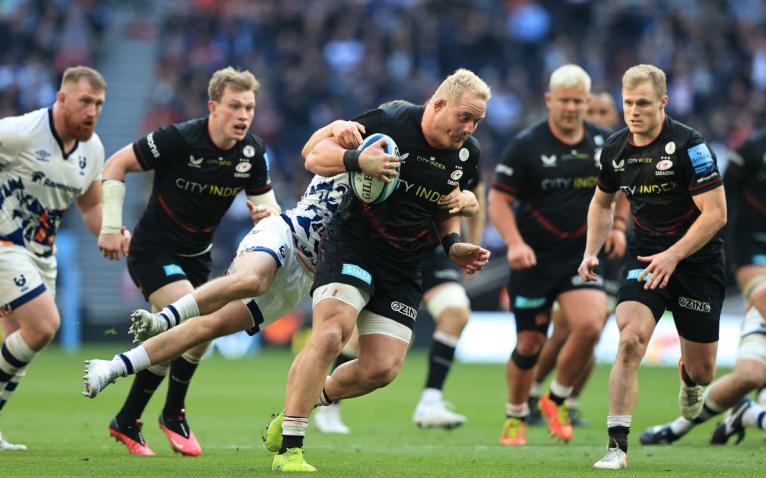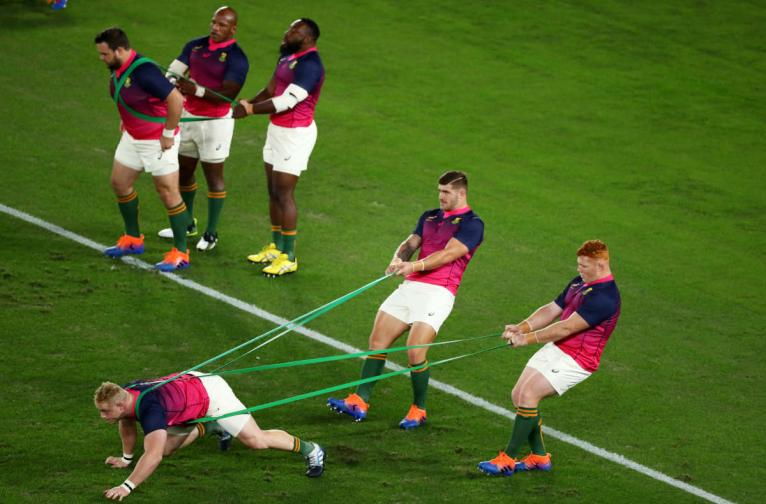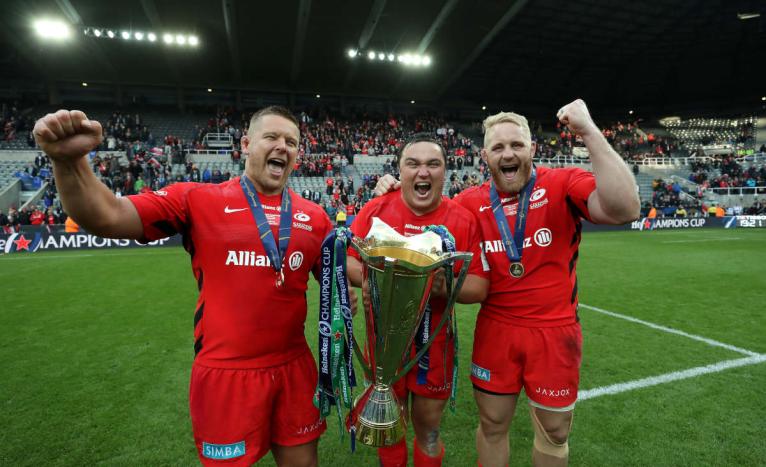For their son’s first birthday party, Vincent Koch and his wife Jandre dressed up as the titular characters from the Pixar movie, The Incredibles. Apart from squeezing into a tight fitting red jumpsuit, this was an easy cosplay for the Springboks and Sharks tighthead prop.
Superficially, he bears a striking resemblance to Mr Incredible. A thick rounded jaw sits below a thin-lipped mouth. His deep-hooded eyes wrinkle when he smiles. His quiff of blonde hair, thinning ever so slightly on the edges of his head, is a carbon copy of his doppelganger. Then of course there’s the meaty arms, the shoulders like boulders and wine barrel chests that could just as easily shield against a villain’s gamma ray gun as stabilise a scrum.
There is, however, one major difference between the two – apart from one being a computer rendered character – and that’s in their motivation. In The Incredibles, Mr Incredible sought fame and glory, even jeopardising his family’s safety for one last moment in the spotlight. Koch, by contrast, totally rebuffs any praise, as if the mere suggestion of him being likened to a superhero is his kryptonite.
“No. I’m definitely not a star,” Koch says firmly in the late afternoon sunshine at the Lensbury Hotel in south-west London, leaning forward in his chair the way all elite-level props seem to do. He laughs as shrugs off the mention of his personal medal collection that includes two World Cups, two Champions Cups, two English Premierships and a British & Irish Lions series.

“I’ve just been in very good teams to be honest,” he offers, failing to mention that you’d have to be pretty handy yourself to play for Rassie Erasmus’ South Africans or Mark McCall’s Saracens. “I think it’s different for a tighthead. You can’t think you’re the man because the next guy will [come along and teach] you other things.
“I’ve learned the hard way. When I was a kid, I thought I was the man and I got humbled quite quickly. My approach from then on in was always to stay humble, work hard, and never take things for granted. For me that is the biggest thing. Never think you’re the big dog because they fall the hardest. Just do what you need to do and continue to serve.”
Koch’s toughest lesson was delivered when he was 21-years-old. Having graduated from the University of Pretoria, where he represented the famed Tuks first XV, he was on the books at the Blue Bulls academy. After a brief hiatus as a consequence of a minor injury, bright eyed and bushy tailed he returned to the camp to find that he’d been axed from the group.
If it wasn’t for my brother I wouldn’t be playing rugby today. I phoned him and told him I wanted to quit, and he talked some sense into my head.
“I still thought I was good enough to be there but I got a call from the coach saying they weren’t going to give me a contract,” Koch recalls. “I thought they’d definitely give me a contract and I couldn’t understand why they cut me. If it wasn’t for my brother I wouldn’t be playing rugby today. I phoned him and told him I wanted to quit, and he talked some sense into my head.”
Looking at this decorated World Cup winner, 13 years later, this crisis of confidence seems unfathomable. Koch brushed himself down, reset and found a new home with the Pumas, a comparatively diminutive union in the north-east of the country that was punching above its weight long before their remarkable Currie Cup triumph in 2022. It was here, between 2012 and 2016, that Koch knuckled down and earned a reputation as a destructive scrummager and a tireless operator in the loose. A Super Rugby debut for the Stormers in 2015 as well as a Springboks debut that year, as a replacement for Jannie du Plessis in a 20-27 loss to New Zealand in Johannesburg, were boyhood milestones reached.

Then came a move to Saracens in 2016 where he helped an already dynastic force plunder silver and gold as if they were marauding pirates on the high seas. In his first year he lifted the Champions Cup. The next season he won the Premiership. A year later another league victory and another European crown were supplemented by a World Cup win. And even when Saracens were relegated in 2020 following a salary cap breach, he stayed on, playing 10 games as Saracens won back their place in England’s top flight, earning his 100th appearance for the club in the second leg of the play-off final against Ealing.
“The thing is, I just do my job,” he says, doubling down on humility. “For me it’s all about the team, it’s not about myself or the accolades. Sure, it’s always nice to see them and to have them, but for me it’s how can I serve the team?”
You never hear someone who is happy to lose. It doesn’t always sound great but that is not why we play the game.
Towards the end of our conversation he lets slip. “Winning is addictive,” he says, momentarily allowing himself to indulge in the intoxicating afterglow of victory. “It’s a feeling you can’t describe. It’s a feeling that you want to feel every week. I’d say I hate losing more than I love winning.”
There it is. The chink in the armour. The gap in the defensive line. He agrees that winning machines are driven by a sense of brotherhood and camaraderie, but there’s also a degree of ruthlessness. That no matter what transpires over 80 minutes, only one result is acceptable.
“We don’t care how we do it,” he explains, drawing a link between the mindsets of the Springboks and Saracens. “You never hear someone who is happy to lose. It doesn’t always sound great but that is not why we play the game.”

On Friday night he’ll have another shot at yet another major trophy. The Sharks – his team for less than a full campaign – have been woeful in the URC but have a shot at redemption in a game they really should win. Gloucester will know that they have a puncher’s chance of causing an upset, but a Sharks team littered with World Cup winners will start as clear favourites in the Challenge Cup final.
Koch won’t be drawn into trash talking and is conscious to heap praise on his opposition, singling out their ability to counter attack from broken play. Instead he draws us back to within the camp and emphasises the importance of blocking out external noise.
Our season in the URC hasn’t been great so we set ourselves goals for the Challenge Cup. We did well in the Pool and then we decided to take this up seriously, so being in the final is unbelievable. It’s massive.
“We can’t be arsed about rumours or noise from the outside. You always get that. For us it’s internal, we don’t really care about the outside world. We set goals and we said we wanted to play in the final.
“Our season in the URC hasn’t been great so we set ourselves goals for the Challenge Cup. We did well in the Pool and then we decided to take this up seriously, so being in the final is unbelievable. It’s massive. Of course you started playing rugby because you love the game, but there’s something special about finals. You work hard throughout the year to hopefully lift a trophy. That drives me.”

Before he heads off to load up on calories, Koch is keen to talk about the importance of this game for South African rugby as a whole. “Our biggest drive is for the Springboks but I think this is very similar to that,” he says. “The Sharks haven’t won anything internationally yet. A South African team hasn’t [won a European title]. It’s for ourselves, for the Sharks, for our fans and of course playing on the international level. We want to walk away and lift the trophy and say again that this was for South Africa.”
Another winner’s medal stuffed in the cabinet back home would be an incredible accomplishment and one befitting a man with a superhero’s nickname, no matter how much he tries to downplay it.


Comments
Join free and tell us what you really think!
Sign up for free